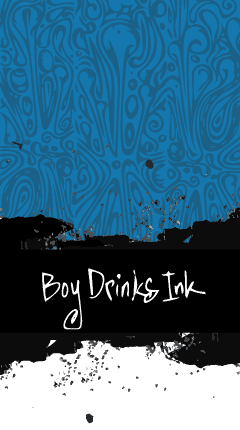
Saul Williams
MartyrLoserKing
Album Release Date: January 29th, 2016
MartyrLoserKing cover design by Anisia Uzeyman - Fader Label 2016
With MartyrLoserKing by Saul Williams—poet, rapper, musician, writer, actor extraordinaire—some familiar qualities from his previous works are present, while new directions are explored as well. His past work has not been easy to define or categorize into one single genre, medium, or theme—and such is true with this album, his 5th full-length release.
Saul comes from a background of slam-style poetry, deservedly receiving considerable praise and widespread recognition as a spoken word performance poet before gaining popularity as a recording artist. He's the most successful artist that I know of who so skillfully bridges contemporary poetry with HipHop, alternative music, and popular culture. His lyrical content abounds with extensive wordplay, double meanings, and symbolism, subverting HipHop conventions with lyrics like "I stand on the corner of the block slanging amethyst rocks" and "I program my heart to beat breakbeats and hum basslines on exhalation". Fusing gritty innercity motifs with references to nature, the cosmos, mythology, literature, and religion, Saul connects the abstract and the concrete, the ancient and the modern, the natural world and the realm of technology. He links the mechanical with the organic, the machine with the human body. And he does so not only with his words, but also in the sound of the music he makes. It's electronic, political, techno-funk, poetry-rap. It's primal, tribal drum beats fused with science fiction soundscapes. And it's awesome.
MartyrLoserKing continues these elements of Saul's previous works and expands them as a kind of concept album about a present day hacker who uses the internet and computer technology to break through and break down social, political, and spiritual chains of oppression. Saul takes on a character (as he did on his earlier album The Inevitable Rise and Liberation of Niggy Tardust, in reference to David Bowie's Ziggy Stardust and The Spiders from Mars) named Martyr Loser King, an activist/hacker, i.e. "hacktivist". The politically-charged lyrics resound on every song, notably "The Bear/Coltan as Cotton". Coltan is a metallic ore used to manufacture electronic products and smartphones, and its mining industry has been cited as a source of serious conflicts in African countries the Democratic Republic of Congo and Burundi, the latter of which is also the name of the album's first single.
Excerpts from "The Bear/Coltan as Cotton":
"...Hack into doctrine
Capitalism, the relation of free labor and slavery
Hack into the history of the bank...
...Hack into desperation and loneliness
The history of community and the marketplace
Hack into land rights and ownership...
...Hack into masculinity, femininity, sexuality
What is taught, what is felt, what is learned, what is shared
Hack into God...
...Hack into whores
Industrial, digital
Hack into code
Use your instrument as metaphor
Hallowed to the ground, type into the mainframe
Dismantle definition, dogma and duty
Hack into the database...
...Hack into celebrity
Hack into the cultural development of taste
Hack into violence, fear, and ignorance
How are they linked?"
This powerful "hack into" refrain perhaps epitomizes the album's thesis; something to the effect of taking the internet, computer technologies, and the mentalities that we've developed from our use of such now ubiquitous technologies, and using them to spark a revolution within and against the very system that created them. It's an examination of the paradoxical implications of fighting against social injustice with means that were made by way of an unjust system. Communications theorist Marshall McLuhan's famous saying "the medium is the message" resonates strongly here, as the content of the music and lyrics reflect on the systems that create the very medium through which the messages are expressed. As Saul says, "use your instrument as metaphor". It's self-reflexive, postmodern art.
The beats are hard and electronic, with heavy bass and percussion—aggressive, head-banging energy intermittently punctuated by grooving flows. Saul's vocals often take on the form of a hypnotic, repetitive chant, alternating between a singsong swing to more melodic singing, with stunning verses of his signature brand of poetry-rap interspersed throughout. There's lots going on, sonically, but somehow the drums and voice seem to resonate most strongly. This is appropriately ironic; despite the prominent industrial/techno/electronica sounds of the music, it's the more primal elements—the voice and drums—that stand out most.
There's a refined uniformity to each song and how they're thematically and aurally linked with one another on the album, every one of its 12 tracks being 2½ to 4½ minutes long. As such, nearly every number shines as a centerpiece in its own right, with scarcely any low points. I'd list the standouts to check out first, but more than half are highlights. Each song plays as a chapter in the same book, or, as with classical orchestral pieces, separate movements comprising a cohesive, unified whole.
MartyrLoserKing is at once political and spiritual, with equal parts dedicated to reality and ideology. It's the computer age meets the skin of the drum, ancient poetry filtered through music studio software. As such it's always vibrant, striking potent chords of discontent, irony, and revolution—underlined by mad, mad bass. Saul proves himself once again as a unique, compelling artist, further establishing stylistic and content commonalities throughout his repertoire while also exploring fresh, exciting directions with each new work.
• Nik Dobrinsky / Boy Drinks Ink
February 29th, 2016
Saul Williams - Photo Credit: Geordie Wood 2016


